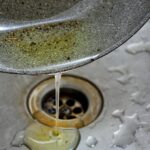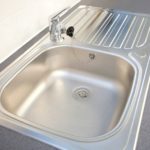Both bathroom and kitchen sinks need to be cleaned regularly. However, while most people periodically clean the taps and sinks, they neglect to clean their drains.
If you’re asking yourself, “Why does my sink smell?” it’s usually because your drains have been forgotten for a little too long.
Keep reading to discover the most common culprits behind smelly sinks, from overlooked food debris to potential plumbing issues. We then provide practical insights and solutions to keep your kitchens and bathrooms fresh and inviting.
Plus, we share some preventative methods and maintenance tips you can employ to stop your sink from smelling ever again!
Why Does My Sink Smell?
Various things can cause a foul smell from your bathroom or kitchen sink, and addressing the specific cause is the first step towards eliminating the unpleasant odour.
Here are some common reasons that cause a smelly sink:
1. Food debris
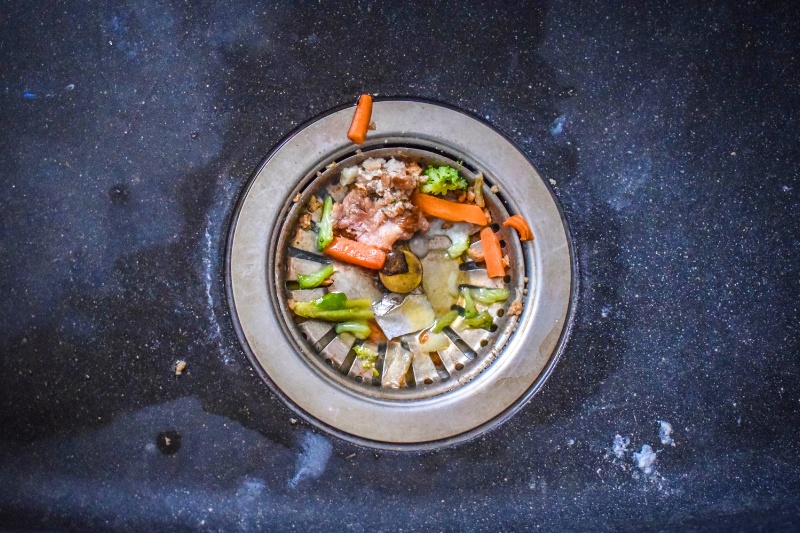
If your kitchen sink smells bad, it could be due to leftover food particles lodged in the pipes.
While washing your dishes and utensils in the sink, tiny bits of food are inevitably washed down the drain and into the pipes.
Using a sink strainer to catch food particles can help reduce the problem, but some small pieces will still make their way down the drain.
Over time, these food particles can accumulate. The food will start to go off and rot, leading to unpleasant odours rising from the sink drain.
2. Grease and fat buildup
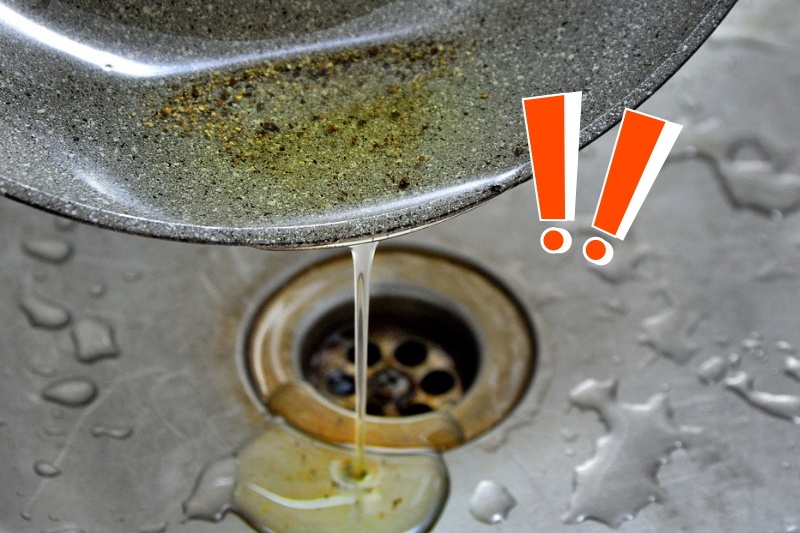
A buildup of grease or fat in the pipes could be responsible for the bad smell coming from your kitchen sink.
Cooking oils and fats may go down the drain in liquid form, but they can solidify in the pipes, causing blockages and emitting foul odours.
This is one of the reasons you shouldn’t pour oils down the sink. Not only does it smell bad, but the blockages can cause issues with your pipes and overall draining system.
3. Bacteria and mould growth
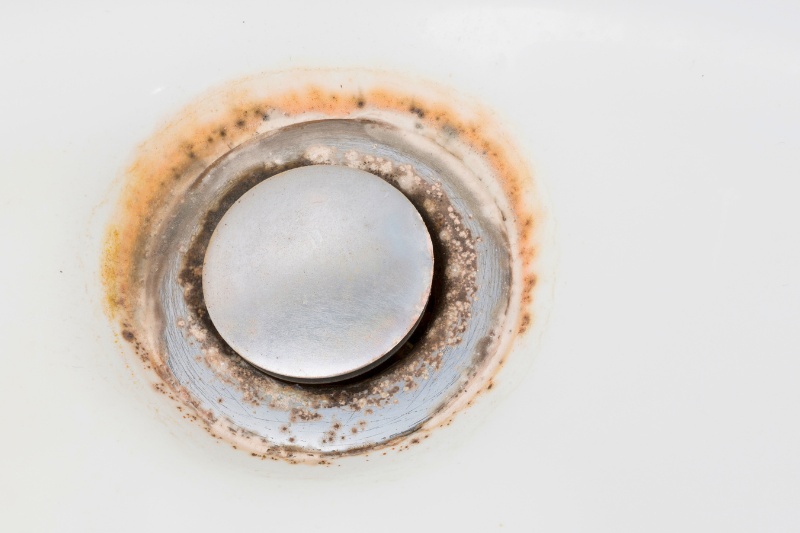
Moist and dark environments are ideal conditions for the growth of bacteria and mould—the exact conditions found in drains in your bathroom and kitchen sinks.
Both mould and bacteria can produce unpleasant odours, so they could be the reason your sink smells.
The specific odours can vary depending on the type of mould or bacteria present:
- Mould releases volatile organic compounds (VOCs) as it grows and reproduces. These compounds have a musty odour or earthy smell, often described as mouldy or mildewy.
- Bacteria produce odours as they break down organic matter. The smells associated with bacterial growth can range from foul and sulfurous (like rotten eggs) to putrid.
4. Clogged pipes
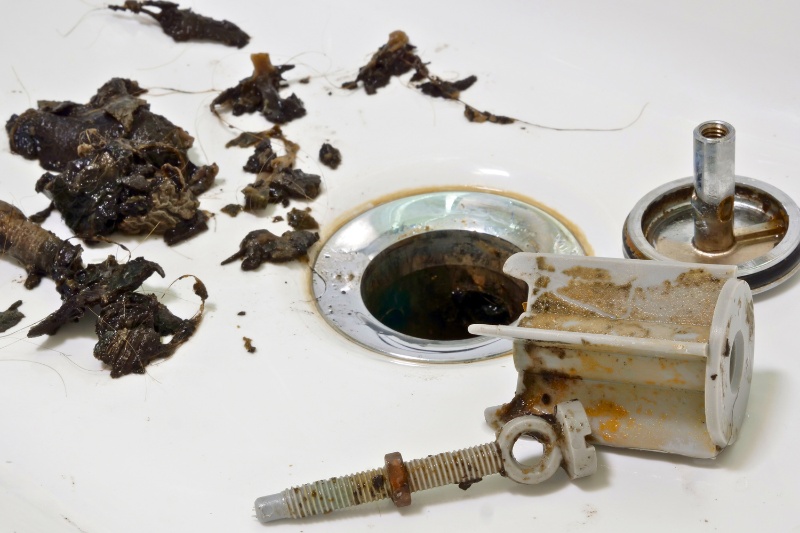
Poor drainage or clogs in the pipes can be the reason your kitchen or bathroom smells stagnant.
Clogs narrow the pipes and make it more likely for things like grease, food particles, and soap scum to get stuck in the drain, all of which can cause foul smells.
Clogs also impede water flow through the pipes, causing them to drain slowly.
The stagnant water allows more time for bacteria and other microorganisms to thrive and produce odorous compounds.
The slow drainage also means unpleasant smells linger longer in the sink.
5. Sewer gases
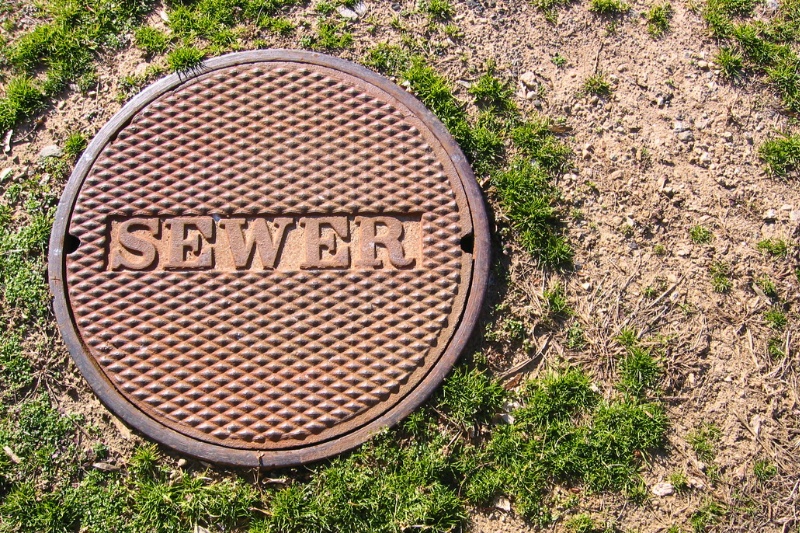
Sometimes, a smell from your sink drain may indicate an issue with the sewer line, such as cracks, leaks, or blockages.
If so, sewer gas has a distinct and unpleasant odour that will come up from the drains and into your home.
Rather than issues with the sewer line, a backup of sewer gases may also be caused by a dry P-trap.
These are u-shaped pipes designed to hold water, which prevents sewer gas from entering your home.
If a sink is not used frequently, the water can evaporate, allowing odours to rise up the drain. It’s one of the most common reasons an unused bathroom smells like a sewer.
How Do I Stop My Sink from Smelling?
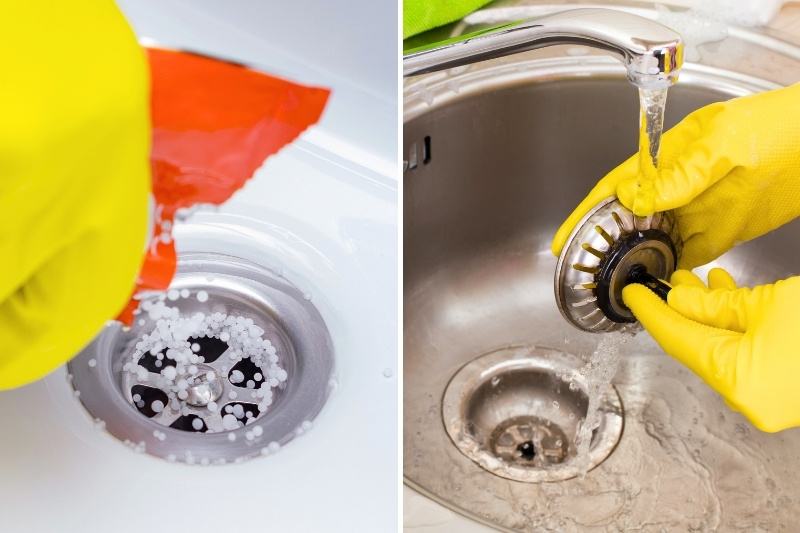
To solve a smelly sink and make your house smell nice, you need to clear the drain of blockages.
This allows water to flow freely through the pipes, helps to prevent more food particles and grease from accumulating, and washes away mould and bacterial growth.
Here is a step-by-step guide to unblocking a sink drain:
- Step 1: Address clogs: If your sink drains slowly or has been completely blocked, use a plunger or a drain snake to clear any clogs. This can help improve water flow and eliminate stagnant water where bacteria can thrive.
- Step 2: Clean the sink: After unclogging the drain, clean the sink and drain Use a mild detergent to scrub the surfaces, paying attention to the drain cover and any visible areas where debris may accumulate.
- Step 3: Add bicarbonate of soda and vinegar: Pour bicarbonate of soda down the drain and follow immediately with vinegar. Plug the drain and leave for about 15 minutes. This fizzing reaction helps break down organic matter and eliminate odours.
- Step 4: Flush with boiling water: Pour a kettle full of boiling water down the drain to help dislodge and flush away any remaining debris. This can be effective in preventing buildup and keeping the drain clear.
- Step 5: Use a commercial drain cleaner: If the unpleasant smell persists, consider using a commercial drain cleaner according to the product instructions. Make sure to follow safety guidelines when using these products.
If this doesn’t get rid of the smell, check the P-trap—the u-shaped pipe you’ll see under the sink.
Check the P-trap for debris and clean it if necessary. Be sure to place a bucket or towel underneath the trap to catch any water or debris.
Does your sink still smell bad? It is likely an issue with the sewer line. If you suspect an issue with the sewer line, it’s advisable to contact a professional plumber to assess the problem.
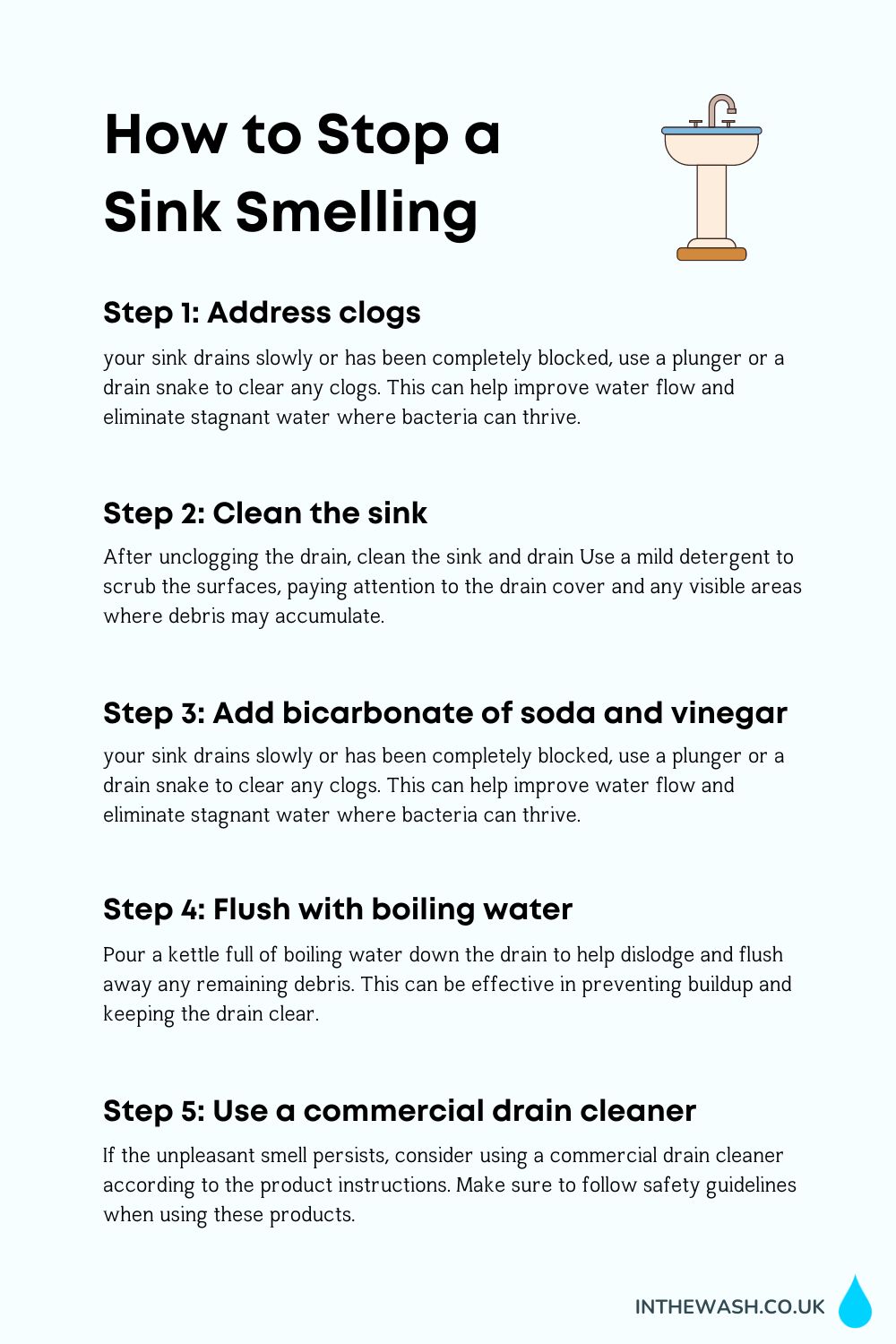
How Can You Prevent a Sink from Smelling?
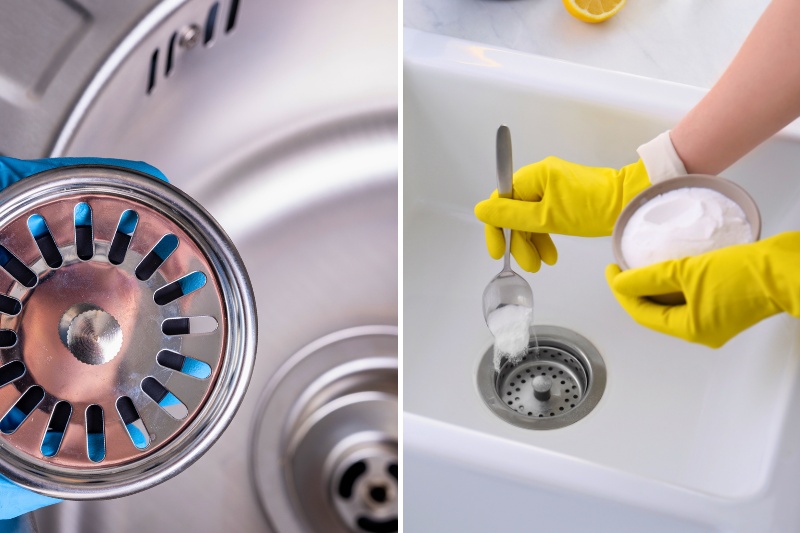
Preventing your sink from smelling is easy—all it takes is regular cleaning and a few clever preventative methods.
Here are some tips and tricks that you can incorporate into your routine to maintain a clean and odour-free home:
- Install a sink strainer in your kitchen sink to catch food particles and debris before they enter the drain. Empty and clean the strainer regularly to prevent buildup.
- Avoid pouring grease or cooking oils down the sink. Allow them to cool and solidify, then dispose of them in your kitchen bin. This helps prevent the accumulation of greasy residues.
- Regularly run hot water down the sink to help melt and flush away grease and soap scum. Hot water can also help prevent the buildup of debris and keep the pipes clear.
- Periodically pour a mixture of bicarbonate of soda and white vinegar down all drains in your home. This helps break down debris and neutralise odours before they become out of control.
- Clean all sinks regularly using a mild detergent or a homemade cleaner. Remember to clean the drain cover and any visible areas where debris may accumulate.
- Ensure proper ventilation in your kitchen and bathroom to reduce humidity and prevent mould growth. Use exhaust fans while cooking and showering, and open windows if possible.
- While chemical sink unblockers can be effective, they may also be harsh on pipes and fixtures. Consider using them sparingly and follow the product instructions carefully.
- If the sink is not used frequently, run water regularly to maintain the water barrier in the P-trap and prevent it from drying out. This helps block sewer gases from entering your home.
- If you notice slow drainage, promptly address the issue using a plunger or drain snake to clear any clogs. This helps prevent water and debris from accumulating and causing odours.

Hannah has a passion for cleaning. She worked her way around Australia by cleaning hostels in exchange for free accommodation and used her cleaning skills to bag a job as a chalet host for a luxury ski company in France.


